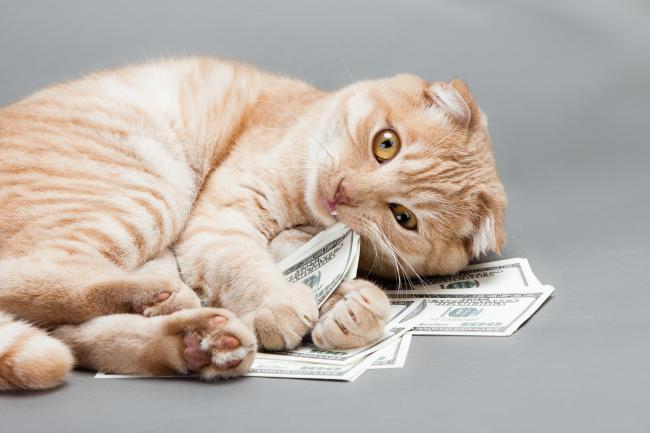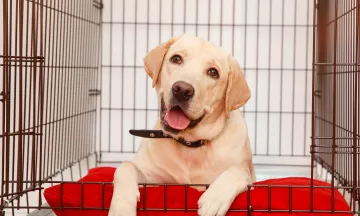We love our pets, but their long-term care can cost a lot of money. Fortunately, there are many simple money-saving tips that can help keep the costs to a minimum. And the great thing: these tips are not only good for your wallet, but also good for your pet.
1) Buy in bulk
The price of pet food can vary considerably. Our tip is to invest in high-quality pet food no matter what. Supermarket food is often cheap, but by choosing high-quality food you ensure the health of your pet, which saves a lot or long-term veterinary costs! And don't buy the food in small quantities, but instead in large bulk bags. You might be able to save by ordering it regularly from a pet supplier online.
2) Make toys yourself
Resist the temptation to impulsively purchase cheap, plastic toys from pet stores as they are often poorly made and easily broken.Your pet is just as happy with homemade toys that have been made with love! Cats have a special preference for cardboard boxes, crumbled up balls of paper and laser pointers. You can make your dog happy with old fleece blanket tied into a tug-o-war toy or an empty plastic water bottle tied-up in a sock. Easy!
3) Regular visits to the vet
When you take your pet to the vet for their annual vaccination, have the vet perform a short check-up on your pet. The vet can detect any underlying health problems early, so they can be treated and avoid ongoing (and expensive) veterinary costs.

4) Make your own furniture and scratching posts
Instead of those super expensive scratching posts in the shops, have a D.I.Y weekend and make a scratching post with planks, pieces of carpet and sisal rope. Another fun D.I.Y project is creating new spaces for your cat to climb and explore by attaching shelves to a wall. You can transform these into cosy nests by attaching a basket or pillow to the shelves with double-sided tape.
5) Earning extra money by taking care of animals
Taking care of animals is fun, rewarding and can fit in with your specific routine. For example, you might be able to walk your own dog with a new doggy friend by their side, take a sweet bunny into your home or pop out to feed your neighbour's cat. And, of course, you will earn extra money from pet sitting! As a pet sitter on Pawshake, you can determine your own rates and choose which animals you want to look after.
6) Adopt a pet
Shelters are overflowing with lovely animals just waiting for a family to care for them. You can give an adopted animal a nice new life for a lower purchase price than a pure-bred pet, but this tip is more than just saving money - it brings the fulfillment of knowing you may have saved a life too. Be sure to always adopt through a reputable animal welfare organisation or shelter.
7) Save on kennels and sitting services
Are you going on a holiday, a weekend away or an unexpected business trip? You don't have to use an expensive animal hotel or boarding kennel. Instead, simply contact a friendly Pawshake pet sitter from your own community. In many cases, a Pawshake pet sitter in your area is an affordable option, and their personal approach can be specifically tailored to your pet's needs.
8) Prevent your pet from getting overweight
Animals that are overweight not only suffer from pain, exhaustion and low energy: they can also suffer from serious illnesses which can lead to higher veterinary costs. Prevent this by paying attention to your pet's nutrition and weigh their food quantities, give treats only occasionally and ensuring your pet gets plenty of challenging exercise. Do you need help walking your dog or playing with your cat? Book a pet sitter at Pawshake who can provide your pooch or feline with some extra exercise
9) Buy second hand
A bench, a dog bed, a cat carrier, a hutch: it's nice to buy something brand new for your pet, but this isn't always necessary. Many items can often be purchased second-hand, which can sometimes save up to 80% of the original price. Moreover, buying second-hand pet equipment is a much more sustainable, eco-friendly option than purchasing new items. Be sure to clean the items thoroughly with an eco-friendly cleaner, so your pet doesn't pick up on the scent of the previous owner.
10) Create a piggy bank
This isn't so much a saving tip, but is VERY important nonetheless: create a piggy bank for your unexpected pet-related expenses. A pet can always surprise you with unforeseen costs. As your dog or cat gets older you may be facing higher vet bills. Or maybe your life changes and you will be needing a pet sitter more often. Are saving and planning not your best qualities? Then you can also take out a pet insurance policy.
Which of these saving tips are you already using? And do you have anything else to add? Share your tips in the comments!



